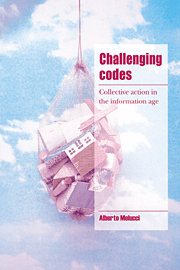Book contents
- Frontmatter
- Contents
- Preface and acknowledgements
- Introduction
- Part I Theory of collective action
- 1 The construction of collective action
- 2 Conflict and change
- 3 Action and meaning
- 4 The process of collective identity
- Part II Contemporary collective action
- Part III The field of collective action
- Part IV Acting collectively
- References
- Index
3 - Action and meaning
Published online by Cambridge University Press: 23 November 2009
- Frontmatter
- Contents
- Preface and acknowledgements
- Introduction
- Part I Theory of collective action
- 1 The construction of collective action
- 2 Conflict and change
- 3 Action and meaning
- 4 The process of collective identity
- Part II Contemporary collective action
- Part III The field of collective action
- Part IV Acting collectively
- References
- Index
Summary
Action made invisible
Without a reference to the systems of action that explain the complexity of the actor and the actor's relations with the whole of the social field, analysis of collective action will not be able to achieve a clear grasp of its subject matter. Below, I shall discuss a number of different interpretative models contained in the literature that make an attempt at precisely this direction, and then take them as examples in trying to show the dependency of movements research on certain implicit assumptions upon which the relative validity of these models rests. As I want to claim, behind their manifest argument they all presuppose a theory of action and identity of the kind I have outlined in the previous chapters and I will complete in chapter 4. An explication of such a covert theory, against which only the explanatory power of these models can be examined, is in order if we are to provide a proper foundation for their claims and redeem the (potentially) enduring value contained in them.
The first such model, which I will call the expectation–reward model, encompasses a broad field of applications (Geschwender 1968; Davies 1969; Gurr 1970; Oberschall 1973; Klandermans 1984, 1989a). It sets to explain collective action in terms of a gap between the expectations and the rewards attached to the outcome of the action and, ultimately, between frustration and aggression.
- Type
- Chapter
- Information
- Challenging CodesCollective Action in the Information Age, pp. 54 - 67Publisher: Cambridge University PressPrint publication year: 1996

